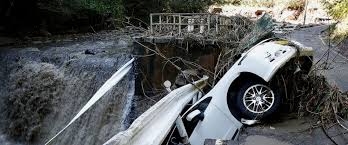Japan looks for missing after typhoon, warned of mudslides

Rescue crew dug through mudslides and searched near swollen rivers Monday after a typhoon caused serious damage in central and northern Japan, leaving dozens of people dead or missing.
Typhoon Hagibis unleashed torrents of rain and strong winds Saturday that left thousands of homes on Japan's main island flooded, damaged or without power.
Authorities warned more mudslides were possible with rain forecast for the affected area during the day Monday.
Kyodo News service, assembling information from a wide network, counted 35 deaths caused by the typhoon with 17 people missing. The official count from the Fire and Disaster Management Agency was 19 dead and 13 missing.
Hagibis dropped record amounts of rain for a period in some spots, according to meteorological officials, causing Japan's many rivers to overflow.
Some of the muddy waters in streets, fields and residential areas have subsided. But many places remained flooded, with homes and surrounding roads covered in mud and littered with broken wooden pieces and debris. Some places normally dry still looked like giant rivers.
People who lined up for morning soup at evacuation shelters expressed worries about the homes they had left behind. Survivors and rescuers will also face colder weather with northern Japan turning chilly this week.
More than 20 rivers had flooded. Some rivers had overflowed in several spots.
Damage was serious in Nagano prefecture, where an embankment of the Chikuma River broke.
Rescue efforts were in full force with soldiers and firefighters deployed from throughout Japan. Helicopters plucked those stranded on the second floor and rooftops of submerged homes.
Areas in Miyagi and Fukushima prefectures in northern Japan were also badly flooded.
In such areas, rescue crew paddled in little boats to each half-underwater home, calling out to anyone left stranded.
Tokyo Electric Power Co. said 56,800 homes were still without electricity Monday in Tokyo and nearby prefectures that the utility serves. Tohoku Electric Power Co. said 5,600 homes were without power in Miyagi, Iwate, Fukushima and Niigata.
Tama River in Tokyo also overflowed, but damage was not as great as other areas.
Much of life in Tokyo returned to normal. People were out and about in the city, trains were running, and store shelves left bare when people were stockpiling were replenished.
